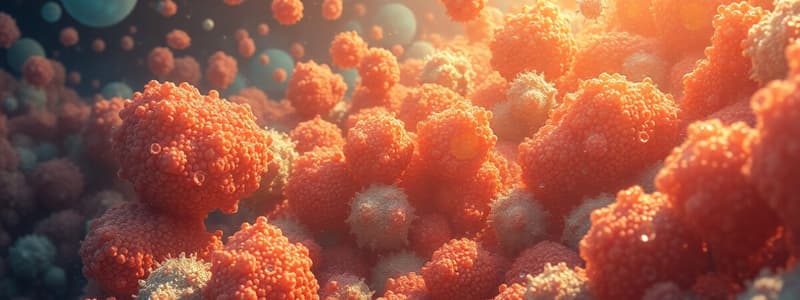Podcast
Questions and Answers
What is the primary advantage of biofilms in microbial communities?
What is the primary advantage of biofilms in microbial communities?
- Limited access to nutrients
- Reduced reproduction rates
- Protection against harmful substances (correct)
- Enhanced exposure to sunlight
During which phase of biofilm development do microorganisms communicate via quorum sensing?
During which phase of biofilm development do microorganisms communicate via quorum sensing?
- Maturation phase (correct)
- Dispersal phase
- Initial colonization phase
- Attachment phase
What role does extracellular polymeric substance (EPS) play in biofilms?
What role does extracellular polymeric substance (EPS) play in biofilms?
- It forms a protective barrier and aids in nutrient retention (correct)
- It promotes bacterial reproduction exclusively
- It inhibits the growth of pathogenic species
- It limits genetic exchange between species
Which of the following best describes the relationship dynamics in biofilms?
Which of the following best describes the relationship dynamics in biofilms?
What is the process by which individual bacteria detach from a biofilm to colonize new areas?
What is the process by which individual bacteria detach from a biofilm to colonize new areas?
What is the primary characteristic of individuals in a reinculture?
What is the primary characteristic of individuals in a reinculture?
Which method is NOT used to obtain reincultures?
Which method is NOT used to obtain reincultures?
What is agar primarily made from?
What is agar primarily made from?
What do peptones primarily contain?
What do peptones primarily contain?
Which kind of media has a known exact chemical composition?
Which kind of media has a known exact chemical composition?
Which type of medium supports the growth of a wide range of microorganisms due to its undefined composition?
Which type of medium supports the growth of a wide range of microorganisms due to its undefined composition?
What is one type of extract mentioned that provides a rich source of vitamin B for media?
What is one type of extract mentioned that provides a rich source of vitamin B for media?
Which of the following is not categorized as a type of culture medium?
Which of the following is not categorized as a type of culture medium?
What is the primary purpose of tryptic soy agar (TSA)?
What is the primary purpose of tryptic soy agar (TSA)?
Which of the following is a characteristic of selective media?
Which of the following is a characteristic of selective media?
How does Sabouraud dextrose agar differ from tryptic soy agar?
How does Sabouraud dextrose agar differ from tryptic soy agar?
What is the role of enrichment media?
What is the role of enrichment media?
Which component in selective media suppresses the growth of gram-positive bacteria?
Which component in selective media suppresses the growth of gram-positive bacteria?
Which type of medium allows for visual differentiation between bacterial species?
Which type of medium allows for visual differentiation between bacterial species?
What type of environment does cold enrichment create for targeted bacterial species?
What type of environment does cold enrichment create for targeted bacterial species?
What is one effect of a pH change in differential media?
What is one effect of a pH change in differential media?
What is the primary purpose of quorum sensing in bacteria?
What is the primary purpose of quorum sensing in bacteria?
Which collection method is used for obtaining cerebrospinal fluid specimens?
Which collection method is used for obtaining cerebrospinal fluid specimens?
What is the role of EPS in biofilm formation?
What is the role of EPS in biofilm formation?
Which of the following methods can help to prevent biofilm formation?
Which of the following methods can help to prevent biofilm formation?
What is an inoculum in the context of culturing microorganisms?
What is an inoculum in the context of culturing microorganisms?
Which type of specimen collection involves inserting a tube through the nostril into the stomach?
Which type of specimen collection involves inserting a tube through the nostril into the stomach?
A pure culture is derived from which of the following?
A pure culture is derived from which of the following?
What is the significance of measuring quorum sensing molecules in bacterial communication?
What is the significance of measuring quorum sensing molecules in bacterial communication?
Which of the following is NOT a source of inocula for culturing microorganisms?
Which of the following is NOT a source of inocula for culturing microorganisms?
What is a typical characteristic of a biofilm?
What is a typical characteristic of a biofilm?
What indicates whether a bacterium has metabolized a substance when an indicator is added to the medium?
What indicates whether a bacterium has metabolized a substance when an indicator is added to the medium?
What type of hemolysis is exhibited by Streptococcus pneumoniae in blood agar?
What type of hemolysis is exhibited by Streptococcus pneumoniae in blood agar?
What is the role of phenol red in carbohydrate broth media?
What is the role of phenol red in carbohydrate broth media?
What is a selective property of Mac Conkey agar?
What is a selective property of Mac Conkey agar?
What makes Mannitol Salt Agar (MSA) selective for staphylococci?
What makes Mannitol Salt Agar (MSA) selective for staphylococci?
What component binds oxygen in anaerobic media?
What component binds oxygen in anaerobic media?
What is the storage temperature for short-term preservation of cultures in a refrigerator?
What is the storage temperature for short-term preservation of cultures in a refrigerator?
What happens to cultures in anaerobic cabinets?
What happens to cultures in anaerobic cabinets?
What is the primary method through which most microorganisms reproduce?
What is the primary method through which most microorganisms reproduce?
Which type of organisms prefer reduced O2 and increased CO2 conditions?
Which type of organisms prefer reduced O2 and increased CO2 conditions?
Flashcards
Symbiotical relationship
Symbiotical relationship
A relationship where both organisms benefit from the interaction.
Commensalism
Commensalism
A relationship where one organism benefits while the other is unaffected.
Antagonistic relationship
Antagonistic relationship
A relationship where one organism benefits at the expense of another.
Biofilm
Biofilm
Signup and view all the flashcards
Biofilm development
Biofilm development
Signup and view all the flashcards
Quorum Sensing
Quorum Sensing
Signup and view all the flashcards
Quorum Sensing Molecules
Quorum Sensing Molecules
Signup and view all the flashcards
Cell Density Sensing
Cell Density Sensing
Signup and view all the flashcards
Quorum Sensing Mechanism
Quorum Sensing Mechanism
Signup and view all the flashcards
Biofilm Inhibition
Biofilm Inhibition
Signup and view all the flashcards
Culture Medium
Culture Medium
Signup and view all the flashcards
Inoculum
Inoculum
Signup and view all the flashcards
Culture
Culture
Signup and view all the flashcards
Pure Culture
Pure Culture
Signup and view all the flashcards
What is a pure culture?
What is a pure culture?
Signup and view all the flashcards
What is the Streak Plate Method?
What is the Streak Plate Method?
Signup and view all the flashcards
What is the Pour Plate Method?
What is the Pour Plate Method?
Signup and view all the flashcards
What are culture media?
What are culture media?
Signup and view all the flashcards
What is agar?
What is agar?
Signup and view all the flashcards
What is a defined medium?
What is a defined medium?
Signup and view all the flashcards
What is a complex medium?
What is a complex medium?
Signup and view all the flashcards
What is a selective medium?
What is a selective medium?
Signup and view all the flashcards
Tryptic Soy Agar (TSA)
Tryptic Soy Agar (TSA)
Signup and view all the flashcards
Complex Culture Medium
Complex Culture Medium
Signup and view all the flashcards
Selective Culture Medium
Selective Culture Medium
Signup and view all the flashcards
Sabouraud Dextrose Agar
Sabouraud Dextrose Agar
Signup and view all the flashcards
Enrichment Culture Medium
Enrichment Culture Medium
Signup and view all the flashcards
Differential Culture Medium
Differential Culture Medium
Signup and view all the flashcards
Visual Characteristics on a Differential Medium
Visual Characteristics on a Differential Medium
Signup and view all the flashcards
pH Change in Differential Medium
pH Change in Differential Medium
Signup and view all the flashcards
Selective media
Selective media
Signup and view all the flashcards
Sugar fermentation
Sugar fermentation
Signup and view all the flashcards
Differential media
Differential media
Signup and view all the flashcards
Selective-differential media
Selective-differential media
Signup and view all the flashcards
Aerobic media
Aerobic media
Signup and view all the flashcards
Anaerobic media
Anaerobic media
Signup and view all the flashcards
Sterilization
Sterilization
Signup and view all the flashcards
Binary fission
Binary fission
Signup and view all the flashcards
Microbial growth
Microbial growth
Signup and view all the flashcards
Lyophilization
Lyophilization
Signup and view all the flashcards
Study Notes
Microbial Nutrition and Growth (2)
- Microorganisms live in association with different species in nature.
- Types of relationships include antagonistic, synergistic, and symbiotic.
Biofilms
-
Biofilms are communities of microorganisms (bacteria and/or fungi) of different species that develop on surfaces.
-
They form a slimy layer that adheres to surfaces like teeth, rocks, and medical devices.
-
Advantages of biofilms include protection against harmful substances/influences, shared nutrients, and exchange of genetic information. Biofilms can also lead to being more pathogenic.
-
The development process of biofilms involves a series of stages: adhesion, multiplication and extracellular polymer substance (EPS) or matrix formation, maturation (communication between microorganisms using quorum sensing) and dispersal.
-
Water currents move among slime layers, allowing efficient access to nutrients and removal of waste products. Individual bacteria or clumps can detach and move to new areas.
-
Quorum sensing is a mechanism by which bacteria communicate with each other using signaling molecules released in the environment. Bacteria measure the concentration of these molecules, which are detected by receptors, to understand the cell density.
-
This allows microorganisms to adjust their biochemistry and shape, as well as coordinate their behavior in response to environmental changes.
Preventing Biofilm Formation
- Pathogenic microorganisms are often more harmful when part of a biofilm, making it important to find ways to prevent their formation.
- Strategies include using drugs that block receptors and break down EPS.
Culturing Microorganisms
- Microorganisms grow using a nutrient medium (nutrient broth) known as growth medium/culture medium.
- Inoculum refers to the microorganisms being introduced into the medium.
- Cultures involve both solid and liquid mediums (broth or agar)
- Different types of media include liquid and solid (nutrient, selective, differential, enrichment).
Types of Culture Media
-
Different types of media support different types of bacteria. Some types of media are used to distinguish between different strains of bacteria.
-
Complex Media: These media have an unknown chemical composition and often include extracts from yeast, meat, or other substances. (e.g., Tryptic Soy Agar - TSA)
-
Selective Media: Contain ingredients that prevent the growth of some microorganisms while allowing others to grow, aiding in isolation. (e.g., selective growth media supporting the growth of gram-negative bacteria)
-
Differential Media: Allow for the visual differentiation of microorganisms based on differences in their metabolic activities or physiological characteristics, aiding in the understanding of species differences. They may contain indicators such as a pH indicator to highlight the result of certain bacterial behaviors. (e.g., MacConkey Agar - MCA)
-
Enrichment Media: Facilitate the growth of a specific microorganism by selectively providing suitable conditions to stimulate its growth while minimizing growth of other organisms
-
Chemical Defined Media: Have known, fixed chemical compositions for accurate and controlled culture situations. (e.g., Specific glucose, phosphate etc., salts in precise fixed quantity)
Microbial Growth
- Microbial growth mainly occurs through binary fission, where one parent cell divides into two identical daughter cells.
- Growth stages include replication of DNA, elongation of the cell between attachment sites, formation of a septum, and division of the daughter cells.
Studying That Suits You
Use AI to generate personalized quizzes and flashcards to suit your learning preferences.




